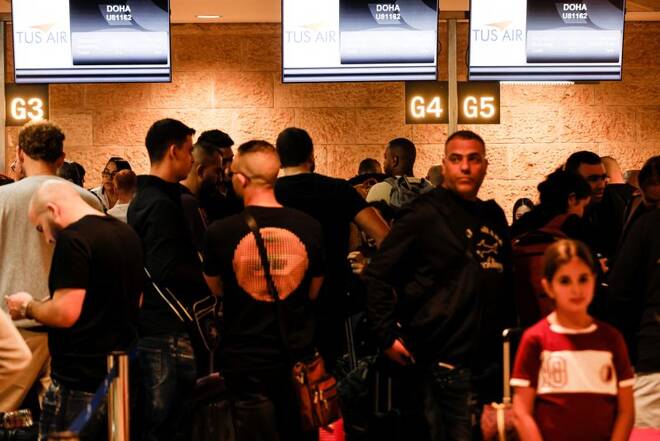Advertisement
Advertisement
Fanfare for first flight from Israel to Qatar for World Cup
By:
By Amir Cohen BEN GURION AIRPORT, Israel (Reuters) - Balloons in the national colours of Israel and Qatar festooned the departure gate for the first commercial flight between the countries on Sunday, permitted by Doha for fans of the World Cup despite the absence of formal bilateral relations.
By Amir Cohen
BEN GURION AIRPORT, Israel (Reuters) – Balloons festooned the departure gate for the first commercial flight between Israel and Qatar on Sunday, permitted by Doha for World Cup fans despite a lack of formal bilateral relations.
While the excitement was mainly at being able to attend the soccer tournament, for which Israel did not qualify, with such surprising ease several passengers voiced hope that the non-stop flights would clear the way to fuller detente with Qatar.
They were issued contact cards for a discreet Israeli consular delegation sent ahead to provide emergency support, a reminder of their current semi-recognised status in Qatar, which is close to Iran and has hosted leaders of Palestinian Hamas.
“There were a few concerns, I cannot deny that,” said Sagi Ashkevitz, flying with three friends to his second World Cup.
“But in the end, the idea of watching (Lionel) Messi for the last time, together with the idea that we are actually making history, overcame all of the concerns,” Ashkevitz added.
At least 10,000 Israelis are expected at the month-long matches, most of them coming through third countries. Those boarding the TUS Airways plane at Ben Gurion Airport were originally told they would have a brief stopover in Cyprus.
But they got a non-stop connection of two hours and twenty minutes instead, thanks to a deal announced by FIFA last week which it described as allowing Palestinians as well as Israelis to fly direct.
While Sunday’s passengers included both Israeli Jews and Arabs, there was no one from the Palestinian territories.
Gabriel Mizrahi, CEO of ticketing agent Tiktik, said this was due to having booked the flight in May, when his Palestinian clients preferred indirect routes through neighbouring Jordan.
Six more Tel Aviv-Doha flights for the World Cup have been approved so far, Mizrahi said. Return tickets cannot be bought separately, he said – a means of ensuring that those who fly back are the same passengers cleared by Ben Gurion security.
The last scheduled direct flight out of Doha to Israel is Dec. 15. The soccer tournament ends with a final on Dec. 18.
Cyprus-based TUS Airways said it had requested an additional three round trip flights due to demand from soccer supporters.
“TUS Airways is honoured to operate such a historic flight and showcase the importance the Republic of Cyprus has on the world stage in connecting and fostering closer ties in the region,” the airline said.
At least two of the fans said they would attend matches in which Israel’s arch-foes Iran were playing.
“I’m going to sit on the Iranian side of the stadium,” said Shlomi Lakash, wearing a baseball cap whose colour – Islamic green – he joked would help him blend in. “God is with me.”
Raki Ziadna held a soccer ball as he stood in the check-in line. He said he believed the World Cup would be “the starter’s pistol for coexistence all over the Middle East”.
(Writing by Dan Williams, additional reporting by Michele Kambas in Nicosia; editing by Ed Osmond and Alexander Smith)
About the Author
Reuterscontributor
Reuters, the news and media division of Thomson Reuters, is the world’s largest international multimedia news provider reaching more than one billion people every day. Reuters provides trusted business, financial, national, and international news to professionals via Thomson Reuters desktops, the world's media organizations, and directly to consumers at Reuters.com and via Reuters TV. Learn more about Thomson Reuters products:
Latest news and analysis
Advertisement
